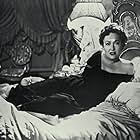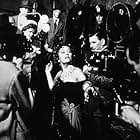A screenwriter develops a dangerous relationship with a faded film star determined to make a triumphant return.A screenwriter develops a dangerous relationship with a faded film star determined to make a triumphant return.A screenwriter develops a dangerous relationship with a faded film star determined to make a triumphant return.
- Won 3 Oscars
- 19 wins & 20 nominations total
Larry J. Blake
- 1st Finance Man
- (as Larry Blake)
Fred Aldrich
- Cop Who Drags Joe's Body from Pool
- (uncredited)
- Director
- Writers
- All cast & crew
- Production, box office & more at IMDbPro
Storyline
Did you know
- TriviaWhen Norma Desmond says to the guard at the "Paramount Studio" gates, "Without me there wouldn't be any 'Paramount Studio'" the words could apply to Gloria Swanson herself, as she was the studio's top star for six years running.
- GoofsAs the policemen run towards the pool, you can see the dead man's head lift up out of the water.
- Quotes
Joe Gillis: Wait a minute, haven't I seen you before? I know your face.
Norma Desmond: Get out! Or shall I call my servant?
Joe Gillis: You're Norma Desmond. You used to be in silent pictures. You used to be big.
Norma Desmond: I *am* big. It's the *pictures* that got small.
- Crazy creditsThe Paramount logo appears as a transparency over the opening shot. The words "Sunset Blvd." are shown stenciled on the curb of that street.
- ConnectionsEdited into Les Amoureux du cinéma (1987)
- SoundtracksThe Paramount-Don't-Want-Me Blues
(1950) (uncredited)
Written by Jay Livingston and Ray Evans
Performed by Jay Livingston and Ray Evans at Artie's party
Featured review
Another Billy Wilder masterpiece
I have yet to see a Billy Wilder film that I haven't loved, and Sunset Boulevard is definitely one of those films. It's interesting to watch the film during different times in one's life when I was a child watching this film, I thought the story was good and that Norma Desmond (Swanson) was a pretty scary lady. In my teens/college years, I appreciated it as a certified classic and for its commentary on Hollywood. Now, in my late 20's and early 30's I found it to have a different impact on me I was saddened by Desmond's mental illness, and when she makes her final descent down her staircase and utters her famous line as the camera pans the faces of the people around her, so full of pity, and the care her butler/ex-husband takes to make sure she's happy for maybe the last time in her life made more of an impact on me than any other time in the 20-odd times I've seen this film. There are only a small handful of central characters in Sunset Boulevard and they are so richly written that this film will remain timeless. There are not a lot of `dated' themes in this film the circle of life that is Hollywood isn't going to be much more evolved in 2050 than it was in 1950. If you haven't seen this film, watch it because there is something for just about anyone in this film.
--Shelly
--Shelly
helpful•14030
- FilmOtaku
- Apr 11, 2004
Details
- Release date
- Country of origin
- Language
- Also known as
- Sunset Boulevard
- Filming locations
- 10060 Sunset Blvd, Los Angeles, California, USA(Norma Desmond's driveway gate)
- Production company
- See more company credits at IMDbPro
Box office
- Budget
- $1,752,000 (estimated)
- Gross US & Canada
- $299,645
- Opening weekend US & Canada
- $169,067
- May 13, 2018
- Gross worldwide
- $304,474
- Runtime1 hour 50 minutes
- Color
- Aspect ratio
- 1.37 : 1
Contribute to this page
Suggest an edit or add missing content














































